
What Parts Do HVAC Systems Have?
AC and heating systems have several different parts. These various parts may need to be repaired or replaced if you have problems with them, as they can all lead to many different types of problems with your air conditioning and heating systems. It is a good idea to know what signs to watch out for that can indicate you have problems with the different parts in your HVAC systems and if you believe you may need HVAC parts replacement in Owensboro, KY or the surrounding area you can reach out to an HVAC contractor such as the team at Hodges Heating and Cooling.
What is an AC Coil?
An AC coil is a type of heat exchanger that is used in air conditioners and heat pumps. It is responsible for transferring heat from the air inside your home to the outside air. The coil is made of a series of metal fins that are connected to a copper or aluminum tube. The air passes through the fins, and the heat is transferred to the tube. The tube is then connected to a compressor, which pumps the heat outside.
There are two types of AC coils: evaporator coils and condenser coils. Evaporator coils are located inside your home, and they are responsible for cooling the air. Condenser coils are located outside your home, and they are responsible for removing heat from the air.
If your AC coil is not working properly, it can cause many problems, including:
- Your air conditioner may not be able to cool your home properly.
- Your air conditioner may make a loud noise.
- Your air conditioner may leak water.
- Your air conditioner may not be able to dehumidify your home properly.
If you think your AC coil is not working properly, you should have it inspected by a qualified HVAC technician.
What is an AC Blower?
An AC blower is a fan that circulates air through the evaporator coil in an air conditioner. The evaporator coil is the part of the air conditioner that cools the air. The blower helps to distribute the cooled air throughout the room. If the blower is not working properly, the air conditioner will not be able to cool the room effectively. There are two types of AC blowers you may have in your unit. These include centrifugal blowers, which use centrifugal force to move air and are typically used in larger air conditioners, and propeller blowers which use a propeller to move air, and are typically used in smaller units.
An air conditioner compressor is a mechanical device that compresses refrigerant gas. The compressor is the heart of the air conditioner, and it is responsible for moving refrigerant through the system and creating the pressure that is needed to cool the air.
The compressor is typically located in the outdoor unit of the air conditioner. It is a sealed unit that contains a motor, a crankshaft, and a piston. The motor drives the crankshaft, which in turn drives the piston. The piston moves up and down inside the cylinder, compressing the refrigerant gas. The compressed refrigerant gas is then passed through the condenser coil, where it releases heat to the outside air. The cooled refrigerant gas is then passed through the expansion valve, where it expands and becomes a low-pressure gas. The low-pressure gas then passes through the evaporator coil, where it absorbs heat from the air inside the home. The cooled air is then blown through the vents and into the home.
What is a Circuit Control Board?
An air conditioner circuit control board is a device that controls the operation of an air conditioner. It receives signals from the thermostat and sends signals to the other components of the air conditioner to turn them on and off. The circuit control board also monitors the temperature of the air conditioner and makes adjustments to the operation of the air conditioner to maintain the desired temperature. If it’s not working, the air conditioner may not turn on and off when it is supposed to.
What is a Condenser Motor?
A condenser motor is a type of electric motor that is used in air conditioners and heat pumps. It is responsible for moving the refrigerant through the system and creating the pressure that is needed to cool or heat the air. The condenser motor is typically located in the outdoor unit of the air conditioner or heat pump. These are just a few examples of the types of HVAC parts replacement you need and when you may need service such as an air conditioner replacement. For more information on HVAC parts replacement in Owensboro, KY call today at 270-244-6486.



